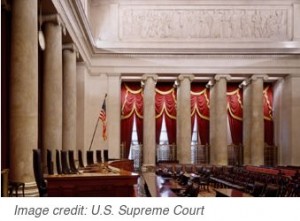 Would televising U.S. Supreme Court proceedings promote transparency in the country’s highest legal institution and help generate public confidence in the judiciary, or would putting the court’s oral arguments on TV or the Internet demean the institution?
Would televising U.S. Supreme Court proceedings promote transparency in the country’s highest legal institution and help generate public confidence in the judiciary, or would putting the court’s oral arguments on TV or the Internet demean the institution?
These and other questions were raised in a Senate Judiciary Committee hearing this morning on “Access to the Court: Televising the Supreme Court.”
While there was no complete agreement on answers to these questions, it appears that the majority of panelists and Judiciary Committee members who spoke support the idea of broadcasting arguments in Supreme Court cases on television.
Two members of the Judiciary Committee, Sen. Dick Durbin (D. – Ill.) and Sen. Richard Grassley (R. – Iowa) are co-sponsoring a bill, the Cameras in the Courtroom Act of 2011, that would actually mandate television coverage in the Supreme Court, with certain exceptions.
Sen. Amy Klobuchar (D. – Minn.), the Committee Chair, opened by saying that citizens have “the right to see how the court functions, and to see its rulings” because “democracy must be open.”
Former Judiciary Committee Chair, retired Senator Arlen Specter, did not mince words for his support of televised Supreme Court proceedings. “There have been no good reasons not to televise the Supreme Court,” he concluded. Supreme Court “nominees speak about their favorable opinion of TV during nominations,” but do a 180° turn when they are on the bench, he noted. Many states and “the highest courts in Great Britain and Canada” televise their court proceedings, Specter argued.
Expressing concern, Specter observed that “it is vital that the public understands what the Supreme Court does” because it “is very ideologically driven at the moment, and I think the public needs to understand that.”
Supreme Court litigator and SCOTUSBlog creator Tom Goldstein testified that he favors televising court cases. “We’re a visual culture,” he noted, and arguing that “sunshine increases public confidence [in the Court], it does not decrease it.’
Mark Cady, Chief Justice of Iowa’s Supreme Court, is a strong proponent of televising U.S. Supreme Court proceedings. Iowa records and streams oral arguments of all court proceedings online, and argued that “the strength and effectiveness of the court system depends on it.”
Skeptics at the hearing included Sen. Jeff Sessions (R. – Ala.). He believes that what happens during oral arguments is not relevant to the court’s decision-making process:
“The only thing that is important is the judgment, the order. Personality is not what a court is about. A court is about its decision.”
Chief Judge Anthony Scirica of the U.S. Court of Appeals for the Third Circuit, was also reluctant to let camera in federal courts. “Co-equal branches of federal government have long-respected each other’s authority to govern itself.” The Supreme Court already is “transparent,” he argued. The justices court opinions already give the public “reasoned legitimacy,” he concluded.
Arguments before the U.S. Supreme Court, and the justices’ deliberations, have always been cloaked in Harry Potter-like secrecy. The public still has access to legal briefs, court opinions, and even delayed access to audio tapes and transcripts of cases argued before the court, most people lack the time and inclination to try access them. Televising U.S. Supreme Court arguments would give the public greater access to country’s highest court, and help demystify it for the public affected by its decisions.
You can subscribe to Justia’s FREE U.S. Supreme Court opinion summaries here.
